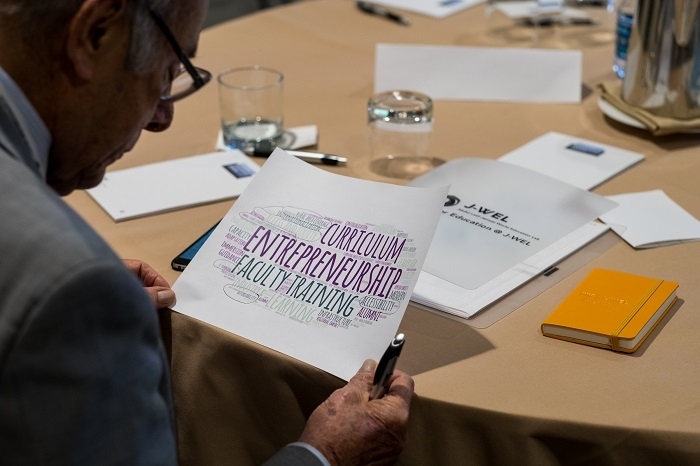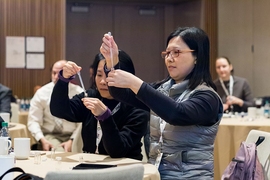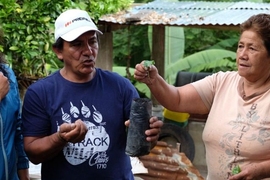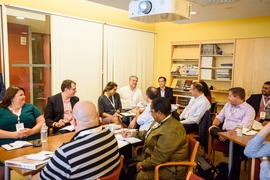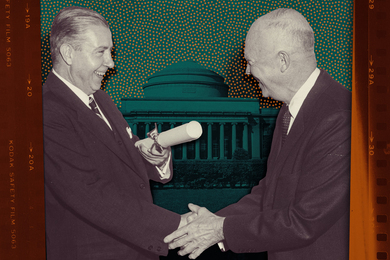In its first year, the Abdul Latif Jameel World Education Lab (J-WEL) has welcomed a diverse group of organizations as members, including leading universities, major non-governmental organizations (NGOs), and top companies. J-WEL, launched in May of last year, promotes excellence and transformation in global education across the lifespan of the learner, through collaboratives at the pK-12, higher education, and workplace learning levels.
The pK-12 Collaborative, under the direction of professors Angela Belcher and Eric Klopfer, has a growing list of members including the Hong Kong-based nonprofit Catalyst Education Lab, Save the Children, educational technology company EnglishHelper (United States), Australia’s Queensland University of Technology (QUT), and the Wadah Foundation (Indonesia).
The Higher Education Collaborative, led by faculty director Professor Hazel Sive, has been joined by members from Africa, Asia, Latin America, and the Caribbean. These include Ahmadu Bello University (Nigeria), Covenant University (Nigeria), Seikei University (Japan), Universidad de los Andes (Colombia), Universidad Mayor (Chile), University of São Paulo (Brazil), and the University of The Bahamas.
Members joining the Workplace Learning Collaborative, which is led by MIT Sloan School of Management Principal Research Scientist George Westerman, include Intelligent Machines Lab and UBS.
“The high caliber of the organizations that have joined J-WEL, and the speed with which they have come on board, is testament to the impact that J-WEL has made in such a short space of time,” says Fady Jameel, president of Community Jameel International, the social enterprise organization that co-founded J-WEL with MIT in 2017. “The different members will bring wide-ranging insights to the table at the pulsating meetings of J-WEL Weeks and other events — but they are unified by their commitment to discovering and sharing innovative approaches to learning, and applying them in the real world.”
J-WEL promotes excellence and transformation in education at MIT and globally by engaging with educators, technologists, policymakers, societal leaders, employers, and employees. Through online and in-person collaborations, workshops, research, and information-sharing events, J-WEL member organizations work with MIT faculty and staff to address global opportunities for scalable change in education. J-WEL shares MIT’s “mens et manus” (“mind and hand”) approach, entrepreneurial spirit, and insights into digital learning, artificial intelligence, learning sciences, and other fields that are disrupting the education and training landscape as well as offering new opportunities to transform teaching and learning.
“Each collaborative is taking a unique approach to engaging with its members to define and explore educational challenges and opportunities that can have global impact,” says M.S. Vijay Kumar, associate dean for digital learning and J-WEL’s executive director, in discussing J-WEL’s first year. “We’re thrilled to have this remarkable group of organizations working with us.”
Professor Sylvio Canuto, University of São Paulo’s research provost and membership coordinator, describes his university’s motivation for involvement: “USP has joined J-WEL due to MIT's long history of excellence and due to the great opportunities that arise from being part of a global program that aims to tackle the great challenge of enhancing education.”
J-WEL supports educational research and innovation by MIT faculty and staff through grants and collaborative projects with J-WEL members. J-WEL engages MIT students through volunteer opportunities at J-WEL events and through the J-WEL Global Ambassadors program, which offers MIT students the opportunity to work on meaningful education projects across the globe.
J-WEL is an initiative of MIT and Community Jameel, the social enterprise organization founded by MIT alumnus Mohammed Jameel '78. Community Jameel was established in 2003 to continue the Jameel family's tradition of supporting the community, a tradition started in the 1940s by the late Abdul Latif Jameel, founder of the Abdul Latif Jameel business, who throughout his life helped tens of thousands of disadvantaged people in the fields of health care, education, and improving livelihoods. Today, Community Jameel is dedicated to supporting social and economic sustainability across the Middle East and beyond through a range of initiatives including J-WEL and two other labs at MIT: the Abdul Latif Jameel Poverty Action Lab (J-PAL) and the Abdul Latif Jameel World Water and Food Security Lab (J-WAFS).
